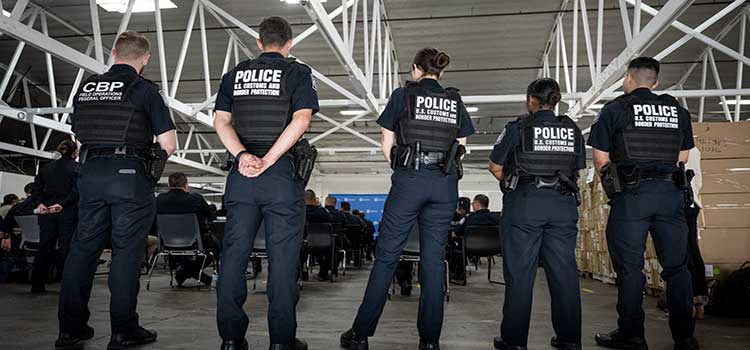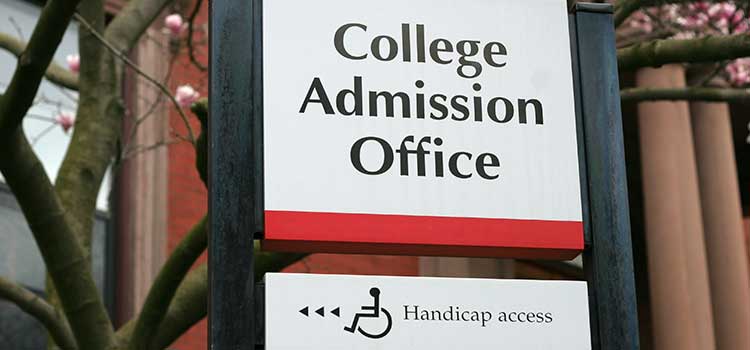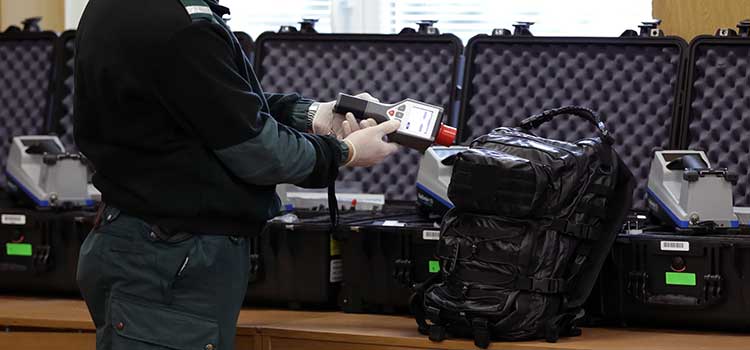In this Article
How to Start a Career in Homeland Security

Homeland security requirements at a glance
What you’ll do: Among other duties, Department of Homeland Security law enforcement personnel help secure borders, respond to disasters or terrorist incidents, analyze intelligence reports, and provide protection for leaders and infrastructure
Where you’ll work: Positions are available across the country at borders, seaports, airports, and bureau offices
Degree you’ll need: A bachelor’s degree, in most cases
Median annual salary: $72,280, according to the U.S. Bureau of Labor Statistics
The Department of Homeland Security’s (DHS) basic mission statement is simple: keep the nation and its citizens safe. This sweeping definition includes security threats that range in nature from terrorism to natural disasters. To accomplish this, the department employs more than 240,000 professionals who work in several agencies with positions that include U.S. Air Marshal, TSA travel screener, Secret Service agent, and Cybersecurity analyst among many others.
There are some general requirements you will need to meet in order to work for Homeland Security. You will need to be a U.S. citizen, and pass a criminal background check as well as a drug screening. Other requirements may include:
- Be at least 21 and no older than 37 years old when hired
- Pass a polygraph test
- Maintain a high degree of physical fitness
- Achieve a competitive score on a civil service exam
How to work for homeland security in 5 steps
Choose a degree program from an accredited school.

Depending on the career you choose, you will generally need at least an associate—in most cases a bachelor’s—degree to work for the DHS.
You can earn a degree in Homeland Security from some schools to prepare for a career in the department. Other common degrees that will prepare you include Criminal Justice, Criminology, Emergency Management, Public Administration, Sociology, Forensic Science, Intelligence Analysis, and Computer Science.
Homeland Security jobs that usually require a bachelor’s degree include:
• Federal air marshal
• Secret Service special agent
• Cybersecurity analyst
• Federal Protective Service officer
There are only a few positions that may require an associate degree or less. Obtaining one of these positions could allow you to enter the profession sooner and potentially continue your education part-time while gaining valuable work experience. For example, transportation security screening jobs require a high school diploma, and border patrol jobs will accept work experience in combination with education instead of a bachelor’s degree.
Earning a degree from an accredited school can help set you on the right path to a successful career in the DHS. Accreditation means the college or university has met standards and requirements outlined by the accrediting organization; it essentially guarantees you are receiving a high quality education.
Many online programs are accredited as well. Online programs allow students to study remotely, at their own pace. These programs are particularly beneficial to working students and those individuals with family and other responsibilities who need flexible schedules. They also allow students to take advantage of specific programs that may be geographically distant.
Apply to a school.

Requirements to be accepted into a bachelor’s degree program at the college or university of your choice will vary. In general, however, you will need:
• High school graduate. You must have earned a high school diploma or GED.
• Have a solid GPA. Highly competitive schools will expect a grade point average of 3.5 or higher while other schools will admit students with 2.0 to 2.5 high school GPAs.
• Complete the prerequisites. Some programs require that you have specific math or science prerequisites met before entering the program. These courses can sometimes be taken concurrently with your degree program if necessary.
• Meet minimum SAT Scores. Some schools may require a minimum SAT or ACT score for admittance.
Earn your degree.

A bachelor’s degree will take about four years of full-time study to complete. It may take longer in some cases, particularly if you enrolled part-time. Your studies may include a variety of courses such as Intelligence, Security, Criminal Justice, Cybersecurity and Terrorism.
Many degree programs may also expect you to complete an internship. Homeland security offers internships through local or state law enforcement, FBI, CIA, and other organizations designed to give students supervised experience. A capstone or class project may also be required.
Apply for and get hired into a Homeland Security position.

Each role within the Department of Homeland Security is unique, and therefore the application process for different positions will also be different. Some positions, such as Secret Service Special Agent, are highly competitive, while other positions, including a TSA security officer, are less so.
Regardless of the position, the application process will include a background check, drug screening and health examination. For most jobs you will need to be a U.S. citizen (sometimes a U.S. national is qualification enough).
There are many steps to the hiring process and it can take a year or so to complete. These steps can include:
• An online application
• Written assessments
• Panel interviews
• Physical assessment
• Background checks
• Drugs tests
Advance your career

Federal law enforcement agents can advance in their career path or sometimes change jobs within the federal hiring system. Advancement is based on performance and experience. In some cases, additional education such as earning an advanced degree, may also help agents land a higher position.
As an example, U.S. Air Marshals can be promoted to supervisory air marshal, a role in which they will oversee others, assign and evaluate work and assist in budget and planning. To be promoted, they need to be an air marshal in good standing and have at least one year at minimum pay grade.
What does homeland security do?
Homeland Security personnel ensure the public’s safety by detecting, preventing, investigating and responding to risks and potential threats quickly and efficiently.
This broad range of responsibilities requires the DHS to have a skilled and varied workforce who can successfully carry out its purpose. There are many numerous law enforcement positions available under the DHS umbrella designed to cover all the necessary areas. Some options include:
- Security Transportation screener:
- Security officers (screeners) work under the Transportation Security Administration (TSA). They screen baggage and passengers to ensure compliance at airports and other travel hubs. Generally, a high school diploma or GED is required to work as a TSA security officer.
- Air Marshal:
- Air marshals work under the TSA to provide protection on commercial airline flights. They often fly undercover to provide in-flight security. Requirements include a bachelor’s degree, or comparable work experience (including at least one year in law enforcement) or combination of education and work experience is required.
- Secret Service Agent:
- Special agents work under the Secret Service to protect high-ranking officials, including the President, Vice President and their families. They also investigate financial crimes against the United States. Generally, at least a bachelor’s degree is needed. Work experience or a combination of work experience and education may be used to qualify.
- Cybersecurity Specialist:
- Working within the Cyber and Infrastructure Security Agency of the DHS, cybersecurity specialists work to protect against computer and other threats. At least a bachelor’s degree is needed.
- Federal Protective Service Officer:
- Federal Protective Services (FPS) provides law enforcement and security to federal agencies and facilities. There are many different positions at FPS, including law enforcement officer, investigator and security specialist, with each having different requirements for hiring.
Where DHS agents work
DHS has numerous positions located throughout the United States. For example, the Secret Service agency is based in Washington, D.C., but many others roles in the DHS, such Border Patrol agent, will be based along the borders or in ports.
There are also positions available in most airports and transportation hubs, which can be found in large and small metropolitan areas throughout the U.S.
Homeland security salary and job outlook
The Bureau of Labor Statistics (BLS) includes federal law enforcement officers under police and sheriffs. Median annual salaries by state are:
The actual salary outlook for DHS personnel can vary, however. The federal government uses a pay scale that includes different grades that take position and experience into account. It also includes pay differentials based on the cost of living for the city in which you are based. Here are some examples:
Transportation Security officer:
Starting pay is $40,500 in Madison, WI.
Secret Service agent:
Starting pay is $47,200 in Atlanta, GA
U.S. Air Marshal:
Starting pay is $39,460 in Philadelphia, PA
In addition, federal employees receive a full benefits package, including pension, sick time and paid vacation time.
The job growth for police and sheriffs is expected to increase about 3.3% until 2031, which is just lower than the average for all professions nationally (5%), says the BLS.
Professional resources
There are a few podcasts that offer good information for those interested in national security careers:
Security Industry Association–Offers profiles of industry leaders and discussions of business issues facing the security industry.
Intelligence Matters–Former acting Director of the CIA Michael Morell speaks with top leaders of the U.S. intelligence community about national security.
Technologically Speaking–Official DHS podcast about the science of homeland security featuring experts on the frontlines of keeping America safe.
Careers at ICE–Dives into the hiring process at ICE and how to put your best foot forward.

